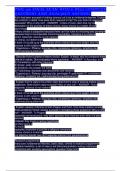Exam (elaborations)
PHIL 230 FINAL EXAM WITH 6 WELL COMPOSED QUESTIONS AND ANALYSED ANSWERS.
- Course
- Institution
Kuhn has been accused of making science out to be an irrational enterprise. Explain this criticism in detail. How does Kuhn respond to this? Do you think his response succeeds? Why or why not? - ANSWER -Critics of Kuhn claim that, by his description of the process of theory choice, theory choice i...
[Show more]



